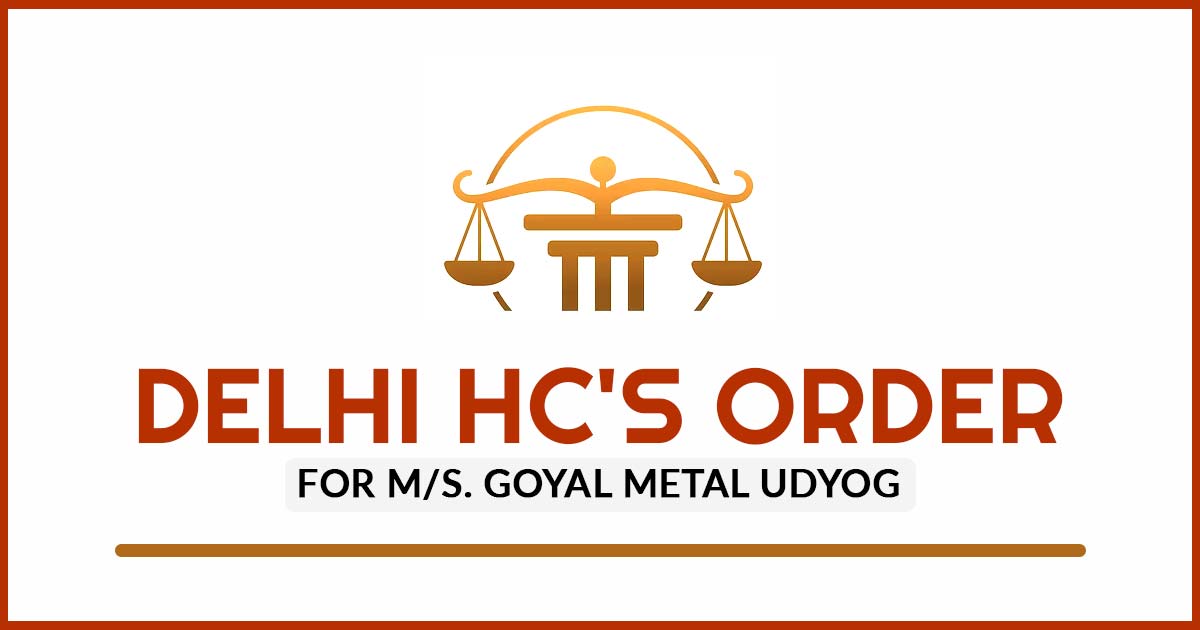
In a recent ruling, the Delhi High Court has ordered the Goods and Services Authorities (GST) to release the cash seized by the authority under Section 67(2) of the Central Goods and Services Tax (CGST) Act, 2017 considering it black money. The court said the move was illegal and also ordered to provide a potential refund.
M/s. Goyal Metal Udyog, a business entity in Delhi, filed the case in the Court. The petitioner’s counsel, Mr. Ruchir Bhatia, and Mr. Rakesh Kumar asked for some relief. The petitioner demanded quashing of proceedings against him, Rs. 50,70,000/- to be released which was seized by the GST authorities, and the adjustment of Rs. 11,41,750/- for future liabilities.
The controversy emerged when officers from the Anti-Evasion Branch of the CGST, Delhi East Commissionerate, conducted a search at the premises of Goyal Metal Udyog. During this search, the officers found Indian currency totalling Rs.50,70,000/- in a locker.
The petitioner argued that the money belonged to their family members and had been relocated from their residential premises to the business premises due to ongoing renovation work at their home and the presence of numerous labourers.
Subsequently, the revenue authorities issued a summons under Section 70 of the Central Goods and Services Tax Act, 2017, asking for various documents, including records of sales and purchases over the past five years, bank account statements, and details concerning other associated companies.
The amount seized during the search was deposited by GST authorities into Syndicate Bank under the name of the Commissioner, CGST, Delhi. Despite multiple pleas from the petitioner, they did not release the confiscated funds.
In an effort to secure the release of the cash, the petitioner was instructed to deposit Rs.11,41,750/-, covering taxes, interest, and penalties. Although the petitioner contested their liability, they deposited this amount based on assurances of the seized funds’ release.
Read Also: Allahabad HC Criticizes GST Authorities for Goods’ Seizure without Jurisdiction
Despite determined attempts by the petitioner, the authorities did not release the seized cash. In response to these developments, the petitioner submitted a letter reiterating their demand for the release of the seized funds.
The respondent revenue, represented by Mr. Harpreet Singh, Suhani Mathur, and Mr. Jatin Kumar Gaur, reaffirmed their findings.
The bench ruled in favour of the petitioner, making it clear that seizing cash on the suspicion of being unaccounted for is illegal.
The court cited a recent decision in the case of Deepak Khandelwal Proprietor M/s Shri Shyam Metal v. Commissioner of CGST, Delhi West & Anr. as a precedent for this judgment.
Important: Provisions, Conditions & Validity of Cash Seizure As Per GST Aspect
The bench ordered the immediate release of the confiscated cash to the petitioner. Additionally, the court clarified that the duration during which the case was pending would be excluded from any applicable time limits for further legal proceedings by either party.
Alongside the immediate return of the seized funds, the Delhi High Court addressed the petitioner’s request for adjustment of the amount of Rs.11,41,750/- against future tax liabilities.
The division bench, consisting of Justice Vibhu Bakhru and Justice Amit Mahajan, concluded that tax authorities cannot seize cash solely based on suspicion of being unaccounted for without solid evidence. This ruling underscores the significance of due process and the rights of taxpayers in such circumstances.
| Case Title | M/s. Goyal Metal Udyog Vs Commissioner of Central Goods & Services Tax & Anr. |
| Date | 22.08.2023 |
| Citation | W.P.(C) 7618/2019 & CM APPL. 42253/2019 |
| Petitioner | Mr Ruchir Bhatia & Mr Rakesh Kumar |
| Respondent | Mr Harpreet Singh, Sr. SC with Ms Suhani Mathur & Mr Jatin Kumar Gaur, Advs. |
| Delhi High Court | Read Order |








